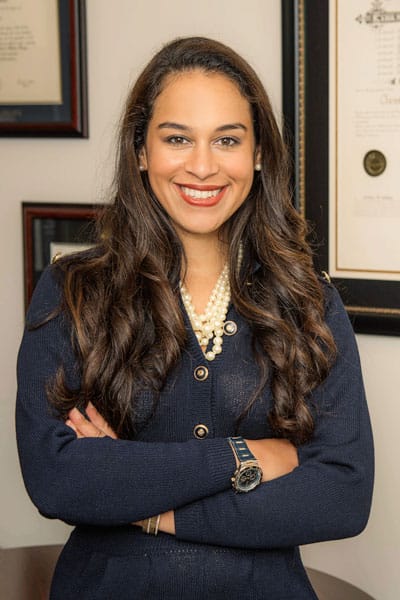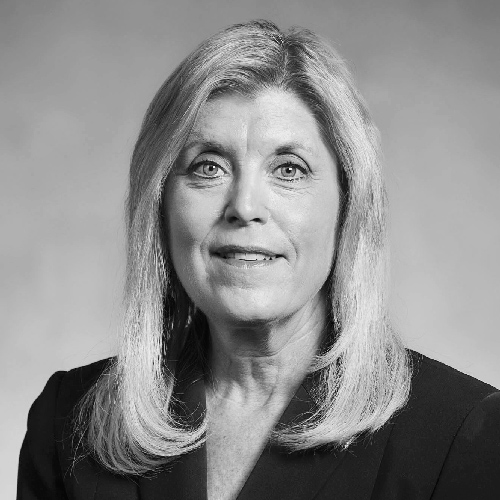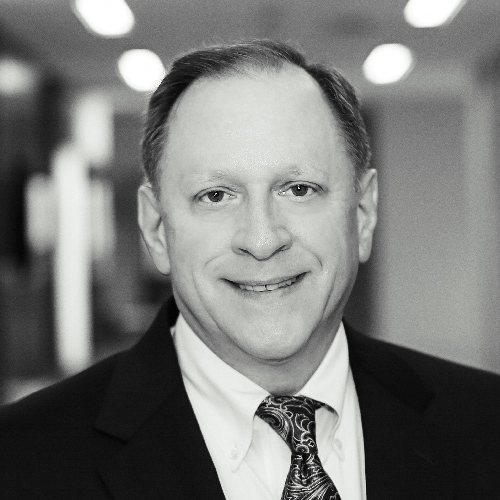Christine Guillory says she approaches her job using a process similar to triage in an emergency room. As the associate general counsel at Ochsner Health System—Louisiana’s largest nonprofit, academic healthcare system—Guillory’s clients are the more than 1,100 physicians spread across Ochsner’s thirty owned, managed, and affiliated hospitals. The organization also includes more than sixty health centers.
“I usually navigate which client is in the most urgent scenario,” she says. “Sometimes it is who has been waiting the longest or who has the most immediate need based on priority. I spend most of my time traveling between campuses so I connect with my clients in person and further develop my relationship with them.”
Risk management, litigation, and medical staff issues are the three divisions of Guillory’s work. She mitigates for loss and helps physicians restore trust with their patients after unanticipated events occur. She crafts policies and meets with groups about how to follow regulatory requirements. One of her biggest projects is implementing the Affordable Care Act’s patient safety organization mandate that went into effect January 1, 2017. Hospitals with more than fifty beds must report to a federally listed patient safety organization. The purpose is to improve healthcare quality through the collection, management, and analysis of patient safety events. Guillory is on several committees that focus on patient safety and healthcare quality.

“Our patients are the guiding force of everything that we do at Ochsner,” she says. “Even if the legal team knows that we are going to have to face a financial settlement or we will be in court, we remain focused on what the patient needs to heal. Our first concern is always patient safety and healthcare. That’s a good feeling.”
Guillory says Ochsner’s 2016 recognition by the Human Rights Campaign as a leader in LGBTQ healthcare equality is an example of the system’s dedication to its patients. The organization also listed Ochsner on its Healthcare Equality Index, a national benchmarking tool that evaluates healthcare facilities’ policies and practices related to the equity and inclusion of their LGBTQ patients, visitors, and employees.
“Treating all patients with dignity, respect, and compassion is at the core of our values,” Guillory says. “The best part of my job is that my clients have a tremendous amount of integrity. They took an oath at the outset of their careers to do no harm, and they take that seriously.”
“Treating all patients with dignity, respect, and compassion is at the core of our values. The best part of my job is that my clients have a tremendous amount of integrity.”
Growth is another area of focus for Guillory. In February 2016, Ochsner announced a $360 million expansion across three areas at its flagship campus. The project, slated for completion in 2019, will increase Ochsner’s capacity to expand specialty services, such as organ transplants and neurologic, pediatric, cardiac, and cancer care.
This growth is also reflected in specialty projects like the Mothers’ Milk Bank of Louisiana at Ochsner Baptist, a developing donor human breast milk bank. A significant number of mothers of premature infants are not able to breastfeed, so donated human milk is an alternative option. Ochsner’s legal department helps support this effort by anticipating and addressing barriers to this new frontier for Ochsner as the team works closely with the Mother’s Milk Bank in Austin until Ochsner’s milk bank is fully developed.
In the same vein, Guillory is working with the sports medicine practice to develop a residency program aimed at preparing staff to address specific orthopedic injuries under the supervision of a physician. Ochnser’s legal department participates in the innovative aspect of healthcare with these programs rather than simply reacting to risk.
“The only way for us to support our clients is to appreciate that growth is the goal,” Guillory says. “It is tricky because with growth comes more liability and more risk. We brace for that impact in a way that is helpful to our clients and doesn’t impede progress. That’s what makes us a department that is viewed as a partner rather than a barrier.”
Guillory says feedback, both positive and negative, helps her to adapt her communication style in a way that makes her clients feel more comfortable. The benefit of that trust is she has found the physicians at Ochsner are willing to be transparent about their mistakes and are quick to call her when they think there is a problem.
Guillory says it’s important to employ emotional intelligence, balancing relationship management and self-awareness. “As litigators, we are trained to communicate in a certain way,” Guillory says. “The trick is to be able to do so while not making your clients and colleagues constantly feel like they are in a deposition. You have to remember that when you are wearing your lawyer hat in a conversation, it can be perceived as a handicap.”
Guillory, a graduate of the University of Southern California Gould School of Law, is one of four litigation lawyers in Ochsner’s legal department. Her direct report is the senior paralegal for the team. The attorneys rotate their on-call schedule to provide Ochsner with 24/7 legal support. Guillory and her team encourage clients to reach out when events occur and questions arise so they can be better prepared as a team. The department also has several transactional lawyers. Collaboration among lawyers is key to their success.
“We depend heavily on each other’s expertise,” Guillory says. “I try to use my strengths of networking and communication to benefit the entire department. Our success is predicated on the lawyers we work with. Recognizing and appreciating that teamwork is crucial.”
The spirit of collaboration is also moving Ochsner forward on a large scale. The company launched the Ochsner Health Network in 2015. It is a partnership between Ochsner, thousands of physicians, and many premier healthcare organizations across the Gulf South region. The goal is to enhance healthcare delivery by combining resources.
“We are a leader among health systems,” Guillory says. “We have patients from every state and around the world. There is an expectation and a responsibility for us to take steps toward making healthcare better for the whole region.”

